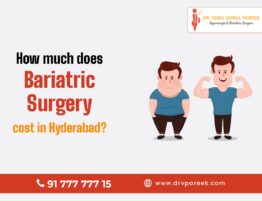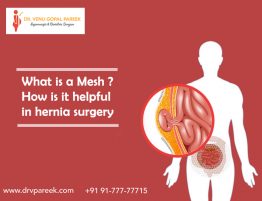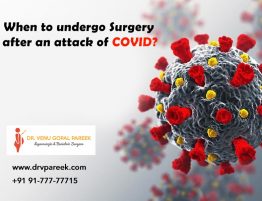
Ventral hernias occur in the vertical center of the abdominal wall. Symptoms include abdominal pain, especially when lifting or exerting with excessive force. Treatment is surgery, including open and laparoscopic procedures.
With increased advances to surgery with minimal access and increased public awareness, one of the most common questions that patients face for surgery is whether to opt for laparoscopy or open surgery. As a doctor, we have to evaluate the risks and benefits of each modality. But in the end, the choice is entirely up to the patient.
In this article, Dr. Venu Gopal Pareek explains to you about what is a ventral hernia, causes, symptoms, and surgical treatment options open and laparoscopic, and which is a better option.
What is a Ventral Hernia?

A ventral hernia is the swelling of organs or abdominal tissue through weak points or openings in the abdominal wall. The abdominal wall consists of fat and muscle that holds the organs in position.
Ventral hernias are hernias that occur somewhere along the midline (vertical center) of the abdominal wall.
What are the Types of Ventral Hernias?

- Epigastric hernias occur in the area between the sternum and the navel.
- Umbilical hernias occur in the belly button.
- Spigelian hernias most common type in older adults occur in the lower right or left part of the abdomen.
- An incisional Hernia, a most common ventral hernia occurs over an incision that does not heal properly.
What are the causes of a Ventral Hernia?
- Infected or not healed abdominal incisions
- Straining or coughing
- Obesity or pregnancy
- Ageing
- Heavy lifting
- Chronic conditions such as ascites
- A congenital disability that prevents the abdominal wall from closing
- Trauma
What are the Symptoms of a Ventral Hernia?

Signs and symptoms disappear when you lie flat.
- Swelling or a lump on the abdomen or over the navel
- Abdominal pain
- Vomiting
- Constipation
- Fever
Treatment of Ventral Hernia:

Ventral hernia requires surgical treatment. If the hernia is left untreated, they continue to grow slowly, and they can cause serious complications.
Untreated hernias can develop into enlarged ventral hernias, which are increasingly challenging to repair. Swelling can cause trapping of hernias, which is called incarceration. This, in turn, can cause a reduction or absence of blood supply to the affected tissue, which can refer to as strangulation. Often, patients look for improvement if it causes symptoms of discomfort, pain. Recovery time depends on the size of the inguinal hernia, the technique used, and the patient’s age and health. The two main types of hernia surgery are:
Open Ventral Hernia Repair

In open ventral hernia repair, also called herniorrhaphy, a person receives general anesthesia to calm or support sleep. This is often supplemented with epidural anesthesia to improve pain recovery and control time. Then the surgeon cuts the abdomen, releases scar tissue, and transports the contents of the hernia (often intestine or fat) back to the stomach and strengthens the muscle wall with stitches. Usually, areas of muscle weakness are reinforced with synthetic or biological tissue to assist the possibility of recurrence further.
Most adults feel uncomfortable after surgery and need painkillers. Vigorous activity and heavy lifting exercises are limited for several weeks. The doctor will discuss when someone can return to work safely.
Laparoscopic Ventral Hernia Repair

Laparoscopic surgery performed under general anesthesia. During the surgery the surgeon makes several small incisions in the abdomen and insert a laparoscope, a thin tube with a tiny video camera mounted on one end. The camera projects an enlarged image inside of the abdomen towards the monitor so, the surgeon can observe the hernia and surrounding tissue. While looking at the monitor, the surgeon carefully repaired the hernia with a synthetic instrument.
People who undergo laparoscopic surgery have a shorter recovery time. However, doctors may find that laparoscopic surgery is not the best choice if the hernia is large or has too much scarring tissue.
Most adults feel uncomfortable after surgery and need painkillers. For several days the patient should limit Vigorous activity and heavy lifting. The doctor will discuss when someone can return to work safely, but you can return to work within 2 to 3 days after laparoscopic surgery.
Laparoscopy vs. Open repair Surgery Which Is Better?

The traditional type of surgery is an open surgery where the surgeon makes a long incision to insert the instrument and visualizes the operation through the incision. For example, In the open approach, the incision for a typical appendectomy is about 4 inches.
Although open surgery is still widespread, many surgeons now undergo laparoscopic surgery.
Laparoscopic surgery, also known as Minimally Invasive Surgery (MIS), or KeyHole Surgery, This is a modern surgical technique in which the surgery is done through a small incision (usually 0.5 to 1.5 cm).
The advantage of laparoscopic surgery is that only a few small incisions are needed. This means that there is less pain and minor external scarring and healing are faster than with conventional open surgery. Another advantage is that the image shown by the laparoscope is enlarged when displayed on the monitor.
Some Of The Advantages Of This Method Compared to Open Surgery Are Below:
The risk of bleeding during surgery is less because the incision is smaller compared with the large incision open surgery. This reduces the chance of blood transfusion needed to compensate for blood loss.
The smaller size of the incision also reduces the risk of pain and bleeding after surgery. When a large incision is made, the patient usually requires medication to relieve pain for a long time until the stitches heal. In laparoscopic surgery, postoperative wounds are much smaller, and the healing process is painless.
Smaller incisions also produce much smaller scars after surgery. In the case with open surgery where the surgical wound is more significant, scar tissue that is formed is more likely to get infected. Sometimes more prone to hernias, especially in overweight and obese patients.
The risk of infection after surgery is reduced as exposure of internal organs to external contaminants is decreased significantly in laparoscopic surgery compared to open surgery. The length of stay in hospital required is much shorter in laparoscopic surgery because the treatment is much faster. Most of the patients are discharged on the same day or next day of the operation and can return to regular daily routine sooner than after open surgery.
Laparoscopic surgery is the better option for a ventral hernia because of all the above advantages compared with open surgery
Conclusion:
Laparoscopic surgery usually requires less treatment time than traditional open procedures, but there are times where only an open procedure should be done. The surgeon can tell you which type of procedure is best for your specific situation. The surgeon can also help you make a decision that will most likely lead to the best surgical outcome you might have. Laparoscopic surgery is the best option for most of the surgery.
A holistic approach is essential in deciding which modality is best for you. Don’t assume that what works for your friends or neighbors is also right for you. Every person is unique; your requirements may be different from others. As a doctor, we are always ready to help you to communicate with you and choose the most suitable way for you.
For more details about ventral hernia surgery, Contact Dr. Venu Gopal Pareek at 9177777715.
About the Doctor:
Dr Venugopal Pareek – Bariatric Surgeon

Dr Venugopal Pareek – Bariatric Surgeon Dr Venugopal Pareek is one of the best Laparoscopic and Bariatric Surgeon in the city has done more than 9000 surgeries in 12 years. Dr Pareek has expertise in Bariatric Surgery. He has attended several conferences and published articles on medicine as well in various national and international journals.







